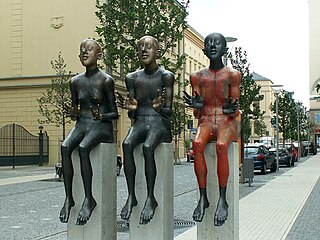Philosophy of religion is "the philosophical examination of the central themes and concepts involved in religious traditions". Philosophical discussions on such topics date from ancient times, and appear in the earliest known texts concerning philosophy. The field involves many other branches of philosophy, including metaphysics, epistemology, logic, ethics, aesthetics, philosophy of language, and philosophy of science.

Religion is a range of social-cultural systems, including designated behaviors and practices, morals, beliefs, worldviews, texts, sanctified places, prophecies, ethics, or organizations, that generally relate humanity to supernatural, transcendental, and spiritual elements—although there is no scholarly consensus over what precisely constitutes a religion. Different religions may or may not contain various elements ranging from the divine, sacredness, faith, and a supernatural being or beings.

Religious pluralism is an attitude or policy regarding the diversity of religious belief systems co-existing in society. It can indicate one or more of the following:

The relationship between religion and science involves discussions that interconnect the study of the natural world, history, philosophy, and theology. Even though the ancient and medieval worlds did not have conceptions resembling the modern understandings of "science" or of "religion", certain elements of modern ideas on the subject recur throughout history. The pair-structured phrases "religion and science" and "science and religion" first emerged in the literature during the 19th century. This coincided with the refining of "science" and of "religion" as distinct concepts in the preceding few centuries—partly due to professionalization of the sciences, the Protestant Reformation, colonization, and globalization. Since then the relationship between science and religion has been characterized in terms of "conflict", "harmony", "complexity", and "mutual independence", among others.
The problem of evil is the philosophical question of how to reconcile the existence of evil and suffering with an omnipotent, omnibenevolent, and omniscient God. There are currently differing definitions of these concepts. The best known presentation of the problem is attributed to the Greek philosopher Epicurus. It was popularized by David Hume.
A belief is a subjective attitude that something is true or a state of affairs is the case. A subjective attitude is a mental state of having some stance, take, or opinion about something. In epistemology, philosophers use the term "belief" to refer to attitudes about the world which can be either true or false. To believe something is to take it to be true; for instance, to believe that snow is white is comparable to accepting the truth of the proposition "snow is white". However, holding a belief does not require active introspection. For example, few individuals carefully consider whether or not the sun will rise tomorrow, simply assuming that it will. Moreover, beliefs need not be occurrent, but can instead be dispositional.
Scientism is the belief that science and the scientific method are the best or only way to render truth about the world and reality.
A worldview or Weltanschauung is the fundamental cognitive orientation of an individual or society encompassing the whole of the individual's or society's knowledge, culture, and point of view. A worldview can include natural philosophy; fundamental, existential, and normative postulates; or themes, values, emotions, and ethics.

Toleration is when one allows or permits an action, idea, object, or person that they dislike or disagree with. Political scientist Andrew R. Murphy explains that "We can improve our understanding by defining 'toleration' as a set of social or political practices and 'tolerance' as a set of attitudes." Random House Dictionary defines tolerance as "a fair, objective, and permissive attitude toward those whose opinions, beliefs, practices, racial or ethnic origins, etc., differ from one's own". The Merriam-Webster Dictionary associates toleration both with "putting up with" something undesirable, and with neglect or failure to prevent or alleviate it.
Exclusivism is the practice of being exclusive, a mentality characterized by the disregard for opinions and ideas which are different from one's own, or the practice of organizing entities into groups by excluding those entities which possess certain traits.
Religiocentrism or religio-centrism is defined as the "conviction that a person's own religion is more important or superior to other religions." In analogy to ethnocentrism, religiocentrism is a value-neutral term for psychological attitude.

Russell's teapot is an analogy, formulated by the philosopher Bertrand Russell (1872–1970), to illustrate that the philosophic burden of proof lies upon a person making empirically unfalsifiable claims, as opposed to shifting the burden of disproof to others.
The conflict thesis is a historiographical approach in the history of science that originated in the 19th century with John William Draper and Andrew Dickson White. It maintains that there is an intrinsic intellectual conflict between religion and science, and that it inevitably leads to hostility. The consensus among historians of science is that the thesis has long been discredited, which explains the rejection of the thesis by contemporary scholars. Into the 21st century, historians of science widely accept a complexity thesis.
Gavin D'Costa is the Emeritus Professor of Catholic Theology at the University of Bristol. His academic career at Bristol began in 1993. D'Costa was appointed a visiting professor of Inter-religious Dialogue at the Pontifical University of Saint Thomas Aquinas, Rome.
The problem of religious language considers whether it is possible to talk about God meaningfully if the traditional conceptions of God as being incorporeal, infinite, and timeless, are accepted. Because these traditional conceptions of God make it difficult to describe God, religious language has the potential to be meaningless. Theories of religious language either attempt to demonstrate that such language is meaningless, or attempt to show how religious language can still be meaningful.
Religious exclusivism, or religious exclusivity, is the doctrine or belief that only one particular religion or belief system is true. This is in contrast to religious pluralism.
Anonymous Christian is the controversial Christian doctrine concerning the fate of the unlearned which was introduced by the Jesuit theologian Karl Rahner (1904–1984) that declares that all individuals, who sincerely seek truth and goodness, and strive to follow the moral truths they know, can respond positively to God's grace, albeit unknowingly or indirectly, even if they do so through other religious traditions and/or are not explicitly aware of Jesus Christ. In other words, God's grace, including the benefits of Christ's sacrifice, are not confined to the boundaries of any particular religious tradition or by our awareness or acceptance of Christian doctrine. Instead, anyone who lives a life of love and goodness, guided by the moral teachings found in Christianity, even if they don't consciously identify with it, is implicitly united with Christ and can be saved through him, implying that non-Christians can still be recipients of God's grace and attain salvation.
Agnostic atheism — or atheistic agnosticism — is a philosophical position that encompasses both atheism and agnosticism. Agnostic atheists are atheistic because they do not hold a belief in the existence of any deity, and they are agnostic because they claim that the existence of a divine entity or entities is either unknowable in principle or currently unknown in fact.
The theology of religions is the branch of theology and religious studies that attempts to theologically evaluate the phenomena of religions. Three important schools within Christian theology of religions are pluralism, inclusivism, and exclusivism, which describe the relation of other religious traditions to Christianity and attempt to answer questions about the nature of God and salvation.
Harold A. Netland, is a missionary educator turned academic. He is the author or editor of nine books and many journal articles on the topic of religion and philosophy.



